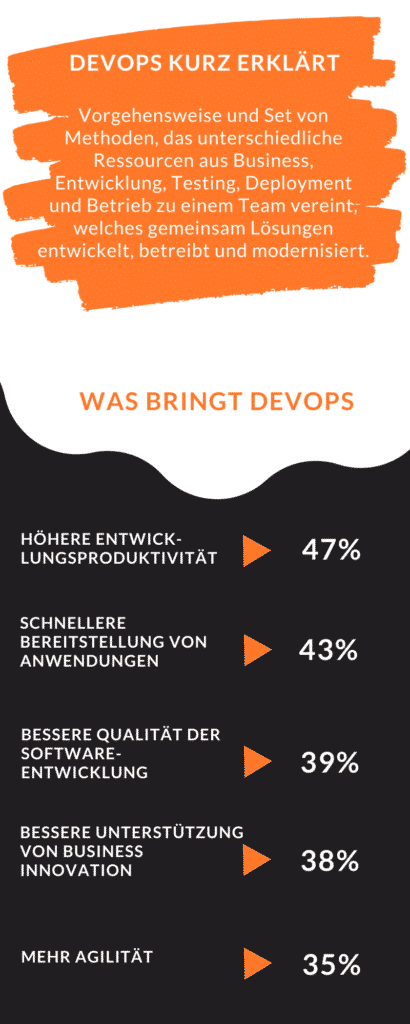DevOps is all about process improvement. Especially in today's world, efficiency and control play a crucial role for many companies. This is precisely the approach DevOps takes, which is derived from the terms Development and IT Operations. But what exactly is this approach and what practical added value does a DevOps system bring to businesses and companies in this day and age?
Inhaltsverzeichnis
What is DevOps?
DevOps systems are based on many corporate structures and applications. This is not a programme or software, but now almost a kind of individual corporate culture. Through the Connection from development and IT operation a DevOps measure has the goal of providing for a comprehensive improvement of administration in the system.
In concrete terms, this means more collective cooperation, more willingness for new experiments, more efficiency in one's own management and more project success. Both the concepts and the employees and, of course, the customers and consumers are integrated into this process around the DevOps concept. This is intended to bring the entire process in the background of IT to a new level in order to make research and development for new process optimisations to make them usable.

General definition
Due to the frequent ambiguity of the term DevOps, new forms of interpretation are constantly emerging in the corporate sense. Even if the goal of the measures is efficient and smooth cooperation in the areas of operations and development, it is possible to Five independent basic principles turn out to be.
- Culture: Maintaining qualitative and personal standards and mutual trust
- Automation: the constant increase in efficiency through the use of machines and learning programmes
- Consideration: mutual transparency and a focus on the company as a whole
- Measurability: uniform assessment for successes and developments in operation
- Sharing: Representation and mutual support with knowledge and insights.
Based on these five areas, the approaches of the systems can be summarised aptly. They always represent the basis of a joint and successful cooperation and pursue the purpose of expanding the quality of the end product. Nevertheless, the focus is always on the employees, who make every new change possible with their commitment.
EXCURSUS: What is the difference to DataOps?
Just as DevOps has changed the way we develop software, DataOps is changing the way we create data products. Using DevOps methods, teams have achieved speed, quality and flexibility by using a delivery pipeline and feedback loop to build and manage software products. DataOps uses a similar workflow to achieve the same goals for teams creating data products. While both are based on agile frameworks, they differ greatly in the implementation of build, test and release. DataOps Services requires the coordination of constantly changing data and all the people who work with data across the company, while DevOps requires coordination between software developers and IT.
What does a DevOps engineer do?
The DevOps engineer has the task, Develop new tools and software solutions and to integrate them into daily operations. Simply put, he is always looking for new options to expand the technical diversity and make work more productive. Numerous skills in computer science and business are required to work as a DevOps engineer. A degree in IT administration also creates a good prerequisite at this point.
In this respect, the focus is on the task of advancing the integration of the DevOps approach in the company and reducing the effort during implementation. Analysis is also an important focus of the work in order to find possible errors in advance and reduce costs permanently. This makes the work of well-trained DevOps engineers an important activity, especially in large companies, in order to maintain full control over development.
"25 percent of German companies want to develop half of their applications with cloudnative tools by 2022" - IDC Study on DevOps"
How should the term DevSecOps be classified?
The constant expansion and development of one's own cloud and software solutions quickly causes significant risks in the area of security. For this reason, the term DevSecOps has become a new benchmark to provide companies with the necessary applications in the area of security despite constant optimisation. This makes problems and Weaknesses can be quickly identified.
In combination with regular tests and reviews of the new software, the DevSecOps approach offers a significant increase in efficiency. Thus, in the event of minor errors, no reversals of previous project successes become possible, as the obstacles can be quickly removed. Despite the increasing automation, security is therefore always maintained.
Conclusion
According to IDC, DevOps is being adopted by more and more German companies. an important tool for development and ongoing operations of applications. The potential can only be exploited if modern infrastructures and current deployment methods are integrated as a holistic process. IDC shows in a recent study that companies that do not yet fully apply DevOps processes still have great potential for improvement. The prerequisite for this is that developers, testers, operations, specialist departments and IT management live the concept. DevOps will not only make application development more efficient, but also raise it to a new level in terms of quality.











0 Kommentare